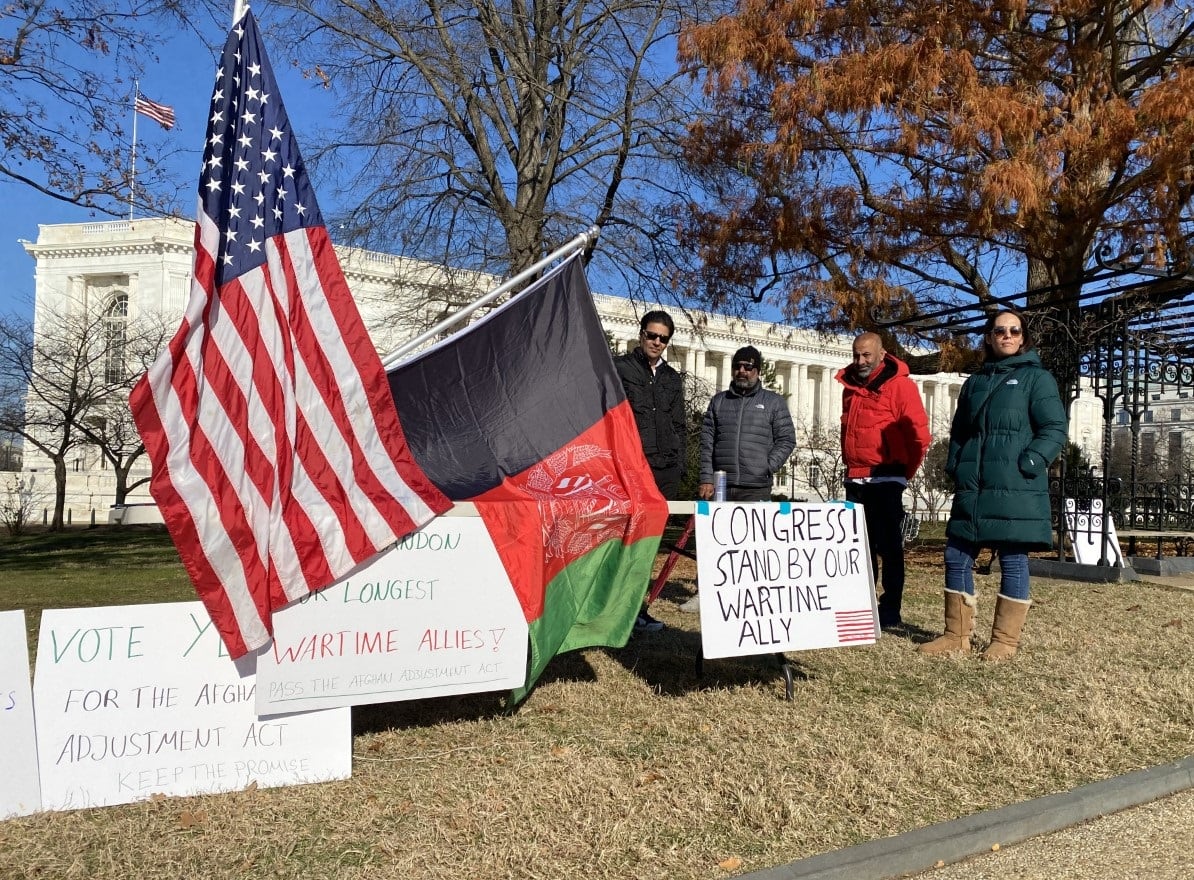Advocates pushing for Congress to help Afghan refugees with new immigration legislation were hopeful in recent weeks that they were inching closer to a legislative victory.
Instead, that optimism was crushed on Tuesday after lawmakers unveiled plans for a massive federal budget bill — likely the last piece of legislation to pass this Congress — without the provisions to help Afghan allies.
“We’ve been out here for three months and five days, we’ve traveled more than 7,000 miles to get the word out,” said Safi Rauf, a Navy reservist who has been among the leaders of the advocacy effort, as he stood outside the Capitol with a small group of protestors.
“We’ve talked to so many veterans about this, and we’ve seen tears from them over how their Afghan allies have been treated. For Congress not to see all of that, it’s disappointing.”
At issue is the Afghan Adjustment Act, legislation concerning the vetting and processing of Afghans applying for permanent legal status.
Since U.S. military forces withdrew from Afghanistan and Taliban forces took control of the country in August 2021, nearly 80,000 refugees have been evacuated from the country. But many living in the United States face uncertain residency status, and live in fear of being forcibly deported within months.
The Afghan Adjustment Act is designed to clear up the immigration status of those individuals and ease the path to citizenship for other Afghans who assisted U.S. military personnel overseas.
The legislation still requires a series of background checks and security requirements, but would do away with some cumbersome barriers like requiring applicants to appear at a U.S. embassy overseas to argue their cases. (The U.S. does not currently have an active embassy in Afghanistan).
Supporters say without action, tens of thousands of Afghan refugees could be forced to return to Afghanistan, where Taliban leaders have already threatened their lives.
“How we treat these Afghan allies defines us as a nation and will be the standard by which the world will forever judge us,” said Matt Zeller, a senior advisor at Iraq and Afghanistan Veterans of America and a longtime advocate for increased support for Afghans who worked alongside U.S. troops.
“Should we fail them now, why will anyone ever trust us in the future?” he added. “Doesn’t anyone get that this will lead directly to more American deaths in future wars?”
On Saturday, a group of retired senior military leaders, including three former Chairmen of the Joint Chiefs, wrote to congressional leaders in support of the legislation, saying the measure “furthers the national security interests of the United States.”
The legislation has the public support of at least 55 senators, including several Republicans, but has been repeatedly opposed by Sen. Chuck Grassley, R-Iowa, over broader immigration issues.
Grassley on Tuesday said that “anybody that helped our military needs to be safely in America” but said he could not support the measure “as long as the vetting process is not improved.”
Rauf said advocates have tried in vain for months to meet with Grassley to find a solution, and have worked with other Republicans to address the vetting concerns. But those changes have not been enough.
Senate Democratic leaders have opted not to press the issue in hopes of passing the spending bill out of the chamber before the end of this week. If lawmakers miss that deadline, a lapse in funding authority would trigger a partial government shutdown.
Rauf said he is baffled as to why no lawmakers will stand up for the measure or the Afghan allies left in immigration limbo.
Senators in the bill did include an extension of the Afghan Special Immigrant Visa program through 2024 and made another 4,000 visas available. But Rauf and Zeller said the program is too slow and limited to help most refugees, making the provision mostly for show.
Protesters are hoping that lawmakers could still amend the budget bill in coming days to include the Afghan Adjustment Act, but know that is likely a long shot. Rauf said the advocates are now shifting their focus from passing legislation to providing legal and emotional help for the families struggling to navigate the immigration system.
“These Afghan allies have sacrificed for the last 20 years,” he said. “So how long is it going to take for us to actually stand by them when they need it?”
Leo covers Congress, Veterans Affairs and the White House for Military Times. He has covered Washington, D.C. since 2004, focusing on military personnel and veterans policies. His work has earned numerous honors, including a 2009 Polk award, a 2010 National Headliner Award, the IAVA Leadership in Journalism award and the VFW News Media award.




